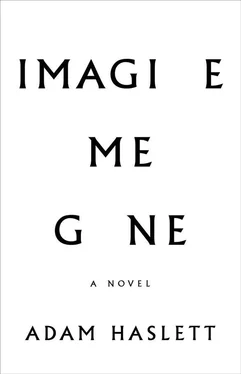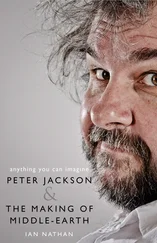For the long drive I make them surprise boxes, which I hold back until we’re halfway there, giving them something to look forward to and buying me a half hour’s peace once they’re doled out. The shoe boxes are full of license-plate games, peanuts, and oranges, a little Lego set for Alec, a book for Celia, and a music magazine for Michael. I have to finish putting them together now before they come downstairs or the effect will be lost, and I manage it just a minute before Alec appears in the kitchen asking, What’s for breakfast?
He’s followed by Michael, who walks straight up to his little brother, squeezes his upper arm until Alec cries out for him to stop, and says, “Mom’s in a preparatory mode which means Dad will cook and he only cooks Viennese eggs so that’s what’s for breakfast, you little thing.”
Michael and Celia both treat Alec as akin to Kelsey on the evolutionary scale, a reliable entertainment when properly goaded.
“That hurt,” Alec says, clutching his arm, but Michael’s not listening. He’s at the radio changing the station, flying over news, violins, shouted ads, Dolly Parton, and rock ballads, up the dial and back down again three or four times before he settles on a disco song, his favorite music of late.
“Please,” I say, “not now.”
“We can’t listen to any more baroque music. It enervates the mind . We need a beat.”
Where does a twelve-year-old get “enervates the mind”? From some novel he’s reading, no doubt. Beguiled by the sound of the phrase, he’ll repeat it for a week before latching onto the next one. He tries them out at the dinner table, usually on Alec, who at seven has no recourse that doesn’t confirm his siblings’ conviction that he’s stupid. “I believe you have delighted us long enough,” Michael said the other night, as Alec tried explaining how the teams worked on field day at school. Michael waited a diplomatic second or two before glancing surreptitiously at John and me to see how we’d reacted to his bon mot. Alec kept on about sack racing, until Michael once more pinched his arm.
“Not now,” I say, so he turns the dial back to whatever it is Robert J. Lurtsema is playing this morning on WGBH, and opens the screen door to let a wheedling Kelsey into the yard, following her out.
The sun’s been up more than two hours already—5:17 this morning, a minute later than yesterday — and is already well above the tops of the pines. Finches and sparrows flutter in the square of the birdbath, which sits atilt in my bed of marigolds. It’s a rather ugly object made of coarse concrete, and it looks forlorn in winter holding askew its dome of snow, but this morning with the splashing birds making its water glisten it’s a perfectly pleasant part of the mild shabbiness of the place — the barn with the collapsed rear roof that we have to constantly remind the children they’re not allowed to play under, and the gently crumbling brick patio, where I’ve got the morning glories blooming up the drainpipe, their petals crinkled like linen around their dusty yellow centers.
Kelsey has lit off down the path into the woods — that’ll be another fifteen minutes — but Michael’s declined to follow, instead stopping at the station wagon, where he’s stepped onto the bumper, and, holding the roof rack, is bouncing the car up and down on its rear wheels, as if it were a beast he could coax into forward motion.
John appears spiffed up in one of his jaunty summer outfits, Bermuda trousers, a canvas belt, a blue Izod polo, ready to captain our seafaring adventures. It’s nothing to the children that the house on the mainland and the house on the island and the boat we use to go back and forth are all loaned to us by a partner of John’s, that we couldn’t possibly afford this on our own, not two weeks of it, not a hundred-acre island to ourselves, and mostly it’s nothing to me — a happy gift that we happened to have been given three years running now, a place I’ve come to love. It’s just that not knowing if we’ll have it, or when we’ll have it until what seems like the last minute reminds me how provisional, how improvised our lives here are.
This isn’t the town we were meant to live in, or even the country, and it’s not the place we want to put the children through school. We lived in London and had Michael and Celia there for a reason, because that was John’s home. And it’s where he wants to return. Living here as long as we have is a kind of accident, really. He was sent to Boston on a consulting assignment for what we thought would be eight months, so we rented this house down in Samoset up the street from my mother, in this town we used to come to in the summers, where she moved full-time after my father died, a house it turned out some carpenter ancestor of mine built back when the whole family used to live around here.
Then John’s firm in London went out of business. And here we were. Lots of space for the children to play in. Their grandmother three minutes away, which has its pluses. So John looked for a temporary job, while our furniture stayed in storage back in England. He found one, then another, and then one potentially more permanent in this new business of venture capital, and the life we’d assumed we’d have — urban, with his friends, and the parties — stayed on hold one year after the next, for eight years now, the presumption we’ll return always still with us, up ahead in the distance. Which can leave me feeling in limbo. Though most often, like this morning, when the children are happy and the weather is fine, I don’t want to think too much about it.
Behind the wheel, John wears his tortoiseshell sunglasses, completing his summer look. He’s a showman when he’s on, capable of great largesse. In his sunny moods the winningness flows like water from the tap. He prefers Ellington to Coltrane, Sinatra to Simon and Garfunkel; likes to dance in the living room after the kids have gone to sleep, and find me across the bed in the morning; and he knows he’ll never stop working or earning, because his ideas for new ventures are that good and there are that many of them, such an easy multiplication to perform. And lately I must say he’s been fine, not overbrimming, but more than half full. Steady at work, and he comes home in time for dinner and to see the children, and plays with them on Saturdays and Sundays in the yard, mowing paths in the field for them to ride their bikes on, and clearing paths in the woods, and really it’s fine, however different it may be from the gin-drinks parties at the house on Slaidburn Street, off the King’s Road, and his glittering eyes and well-dressed friends, and so much of that time in London before our wedding.
I knew him naively, then. He wasn’t raised to be understood in the way people think of relationships now. He grew up in the old world of character as manners and form, emotion having nothing to do with it, marriage being one of the forms. Which isn’t to say he doesn’t love me. He’s just British about it. I think when he met me he realized he might be able to escape some of that, in private at least. In his eyes, I had that American openness he admires, though in fact by coming to London I was escaping my own old world of coming-out balls and the matrons of Smith College. We were meeting in the middle, I suppose.
“At least we all speak the King’s English.” That’s what his mother said to no one in particular at the dinner table the first time I visited his parents, outside Southampton. She was apparently less appalled at my accent than she’d expected to be. His father had installed a putting green by the side of the house, where he spent most of his afternoons before coming in for a supper he preferred eating in silence. At breakfast, there was the tea cozy, and cold toast in a rack, and at Sunday lunch mint jelly with the dry lamb, and in the evening being asked if I planned on taking a bath. John was and is his mother’s favorite, the oldest, who went to Oxford and into business and wears good suits and understands there are proper and improper ways of going about things, all of which he plays up when he’s around her, keen to reflect back her image of him.
Читать дальше












